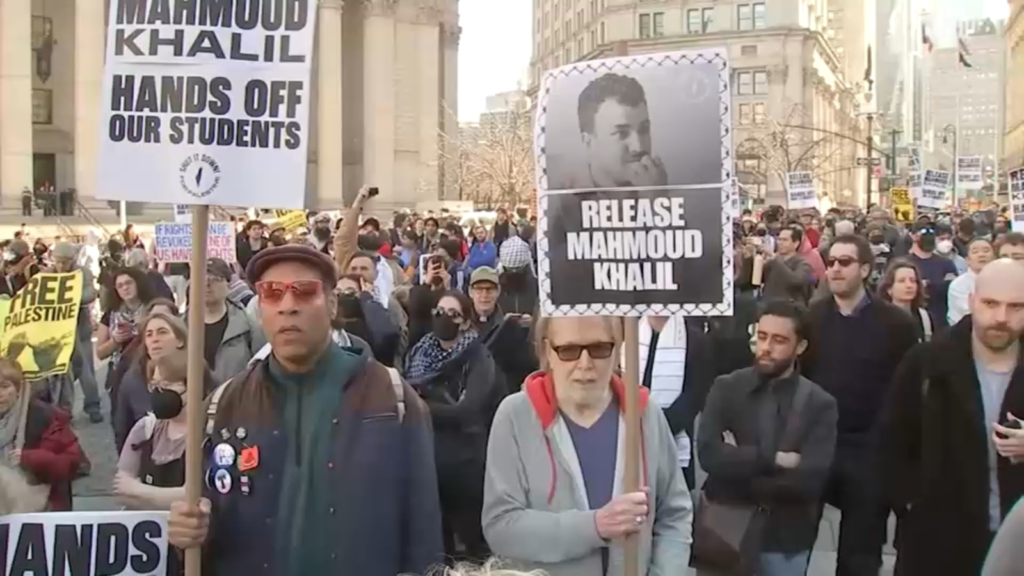Who is Mahmoud Khalil?
Mahmoud Khalil is a 30-year-old legal permanent resident in the United States. He was born in Syria and holds citizenship in Algeria. Khalil gained public attention through his activism supporting Palestinian rights. While a student at Columbia University, he participated in protests related to the situation in Gaza. Khalil is married to a U.S. citizen and has a child born in the United States.
What is the Deportation Order?
In September 2025, an immigration judge issued an order for Mahmoud Khalil’s deportation to either Algeria or Syria. The order was based on allegations that Khalil deliberately failed to disclose certain information on his green card application. The judge found that these omissions were intentional and material, meaning they could have affected whether his application for permanent residence was approved.

Current Legal Protections
Despite the deportation order, Khalil is currently protected from immediate removal. A federal district court has issued an order preventing the government from deporting or detaining him while his civil rights case proceeds. Additionally, a separate federal judge blocked his deportation, citing potential violations of his First Amendment rights related to free speech and unlawful detention. These rulings mean Khalil remains in the United States while his case is being reviewed.
Government’s Justification for Deportation
The government’s main argument rests on three points:
- Khalil made material misrepresentations in his green card application by omitting important information such as previous organizational memberships.
- His continued presence in the U.S. allegedly harms foreign policy interests.
- Khalil’s actions were willful, meaning the omissions were deliberate and not accidental.
The government denied requests for any exceptions or waivers, stating the evidence showed Khalil was aware of what he was withholding.
Supporters’ Concerns
Critics argue that Khalil is being targeted because of his political activism, particularly his pro-Palestinian protests, which are protected by the First Amendment. They claim the deportation is an attempt to silence dissent and restrict free speech. Supporters also express concern over due process, saying Khalil has not been given a fair opportunity to contest the allegations. They highlight the personal impact on Khalil, who faces separation from his family and risks to his safety if deported to Syria or Algeria.
Timeline of Key Events
- March 2025: Khalil was arrested by immigration authorities, and his green card status was challenged.
- March to June 2025: Khalil was detained in immigration facilities for over 100 days before being released after legal challenges.
- April 2025: An immigration judge initially ruled that Khalil could be deported under foreign policy grounds.
- September 2025: A new deportation order was issued based on alleged misrepresentations on his green card application.
- September 2025: Separate federal court orders blocked Khalil’s immediate deportation or detention.
Legal Issues at Stake
Several important legal questions will determine the outcome of Khalil’s case:
- What counts as a “material misrepresentation” under immigration law? The court will need to decide if Khalil’s omissions were significant enough to justify deportation.
- Can the government deport a lawful permanent resident for political speech or activism? This raises complex issues about the balance between national security, foreign policy, and constitutional free speech protections.
- Were Khalil’s rights to due process respected? This includes whether he was given proper legal representation and a fair hearing.
- What is the status of Khalil’s appeals? He has the right to challenge the deportation order in higher courts, and stays can prevent his removal while appeals are pending.
Broader Significance and Reactions
The case has attracted attention from civil rights organizations, immigration experts, and free speech advocates. It tests the limits of how far the government can go in revoking permanent residency based on political activism. The case also highlights concerns about how immigration law can be used to suppress dissent and the risks of weakening constitutional rights for non-citizens. University campuses have been central to the debate, as Khalil was a prominent student activist.

What Happens Next?
The government’s deportation order can be appealed to the Board of Immigration Appeals. Meanwhile, the federal civil rights lawsuit continues in New Jersey, challenging the lawfulness of Khalil’s detention and deportation attempts. Depending on how these legal battles unfold, the case could potentially reach the Supreme Court. For now, court orders prevent Khalil’s deportation or detention, allowing time for the legal process to play out.
Conclusion
The case of Mahmoud Khalil raises important questions about immigration law, free speech, and political activism in the United States. Khalil, a lawful permanent resident and father, faces deportation based on alleged misrepresentations during his green card application and his activism. At the same time, federal court rulings protect him from immediate removal and provide time for further legal review. The outcome of this case will have wide-reaching consequences for how constitutional rights and immigration enforcement intersect, especially for politically active non-citizens.
Do Follow USA Glory On Instagram
Read Next – U.S. National Debt Crisis Threatens Future Spending






